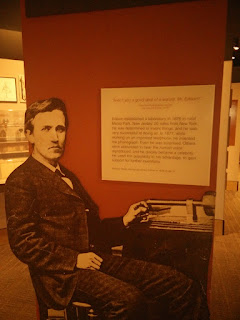In the 1870s three revolutionary technologies shook the
world and changed it forever :
1876 : telephone
1877 : phonograph
1879: electric light bulb
All were basically leap-frog innovations, but based on
existing science and technology.
The contrasting impact of the three were fascinating.
Phonographs which earned Edison the moniker Wizard of
Menlo Park, completely stalled, because amplifiers were bad, duplication
was not possible, etc. That problem was solved 20 years later by invention of
the triode (ironically inspired by Edison’s electric bulb).
Telephones revolutioninzed business, government, industry,
banking and military, but took nearly forty years to become consumer goods.
The electric light was utterly transformational across every
facet of society. Until Edison’s light bulb, electricity was also mainly
industrial or business oriented. Heavy magnets at harbours and factories, and
the telegraph were the only public benefits of electricity until then.
Edisons light bulb changed all this. It brought electricity
into every urban home and office within 20 years in most of the West.
It became a platform for a whole horde of technologies as
transformational as the steam engine earlier, and transparent glass even
earlier.
Electricity’s impact was rivalled only by the arrival of petrol/diesel
engine cars, also invented in the 1870s but which had no or very low impact for
nearly 25 years.
Electric cars, trains, buses all came into use, around this
era, but were of poor quality and not very widespread. They were all overtaken
by petrol based vehicles by 1920 or so and electric vehicles did not challenge
petrol/diesel vehicles until Elon Musk’s Tesla transformed the industry in the
2010s. Henry Ford actually worked in Edison’s electric companies, rising
quickly to Chief Engineer, before quitting to revolutionise petrol based cars
and make them widespread.
 |
| Edison's telephone: Picture from Internet |
The triode, born out of the diode, invented by Ambrose
Fleming (more famous for Fleming’s left hand rule), was discovered to be an
amplifier of current, which became very useful for radios, invented shortly
afterwards. Then the triode amplifier became useful to amplify the sound in phonographs.
Edison’s original tin drum phonograph did not take off, but Zenophile Gramme
invented the flat disk version, now popularly called gramophones. By 1910 mass
manufacturing of gramophones combined with amplification to make the sound output
of gramophone, made them explode in popuarity – nearly two decades after Edison
and Gramme’s inventions. I suspect Edison himself had switched over to focusing
his efforts on the light bulb – and after it the development of the entire
electrical system, primarily because the phonograph evoked more wonder than
sales.
The telephone itself, was also improved by Edison,
especially by addition of a battery, providing
a stable current rather than using a windup mechanism to power the transmission
of electricity across telephone lines. Alexander Graham Bell’s company AT&T,
bought Edison’s phones to sell to their customers – became more the telephone exchange
rather than equipment manufacturer.
Ironically phonographs/gramophones succeded in the one field
Edison did not imagine at all – recorded music. Again ironically, Edison worked
on the cinematograph and movie making, but again failed to understand what
entertainment would be popular. The movie making world ran away from New York,
where Edison was based, to California – too far even by train – to escape
Edison’s attempts to monopolize the field.
It is fascinating how the three inventions panned out. Rarely
is their comparative history narrated together.
But the phonograph, lightbulb, electrification, (and also triode,
radio, airplane etc.) were inventions that did not come from the learned halls
of brilliant academics with doctorates in philosophy or from the wise poets and
artists who bore on their shoulders the learning of a hundred previous
generations, but basically the most uneducated/ self-educated, hyper motivated,
relentless, incredibly ingenious people like Edison, Ford, Benz, Daimler,
Westinghouse, Lee de forest, Fessenden, etc.
Thorstein Veblen, the economist, predicted in 1899 that
engineers would run the world , because they were the only people who
understood how everything worked.
He was wrong, IMHO. Most engineers don't understand people
or money.

Really? Did the movie industry move to California to escape Edison's attempt at monopoly or is that ur conjecture?
ReplyDeleteBecos I've never heard of this till now.
Yes the comparison is v interesting becos, a complex combination of factors seem to influence the fate of inventions - just like movies - rather unpredictable.
They also wanted the sunny climate of California and the cheap land in the then undeveloped Los Angeles, but Edison was a major factor.
Delete